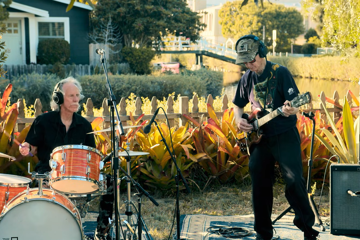Arthur Miller's 1949 Pulitzer Prize- and Tony Award-winning play, Death Of A Salesman, proved that tragedy was not, and could not, be confined to the realm of the Greeks or Shakespeare; protagonist Willy Lowman is burdened by tragedy of similar proportions, but shoulders the weight of it in a mundane world where any everyman can slip through the cracks. Director Simon Stone has turned an acute eye to tragedy on stages recently – familial in The Wild Duck, Greek in Thyestes, bourgeois in Baal – and when it came to him tackling Miller's benchmark, the question was less 'how?' (he's proved himself capable) and more 'when?'.
“There comes a time where a classic has to be done, where it needs to be put on in order to provide historical context to the time that you're living in, and that particular time has arrived for Salesman in Australia and America and England and in fact all over Europe,” says Stone, who will direct a production of the play at Belvoir with stage great Colin Friels in the lead role. “I imagine there are a whole lot of people who are going, 'Wow, gotta put on Salesman,' because it's a play about the capitalist structure failing the most common man. Although Miller previously wrote a play about that back in 1949, we've spent several decades ignoring that forewarning – and the forewarning of all sorts of people and artists, but Miller has created perhaps the greatest piece of art to reveal the inhumanity of the capitalist trend and to be living in a world that's crumbling economically as a result of the greed of a few dream-makers.”
By his own admission, Stone has had his eye on Miller's script for some time, and while it is only now that he is finally directing a production, he points out that Miller's writing has informed much of his work to date. “It is very much the prime example of tragedy of the common man and it is a path that the late 19th century naturalist writers, that I've had a lot to do with in my work, began. They forged that path and Miller took it to its ultimate conclusion, which is not just watching great men from the middle-class world; we can actually watch ordinary men from the working-class and middle-class worlds struggle with ordinary tragedies, the most everyday, ordinary tragedies. And it's such a revolution, the idea of using the banalities of everyday life with the heightened traditional Greek tragic modes that he presents it in. That juxtaposition is wonderful.
“Anyone who has seen the history of my work may think that I've moved towards Death Of A Salesman, but I have as much moved from Death Of A Salesman towards all of the things that I did in the past. I've read and been obsessed with way more plays than I will ever be able to put on stage, and often the way that I write things is influenced by particular authors that no one has ever seen me grapple with as a director, so while Salesman is the next step from something else that I've been doing, it was also often between each of the steps that I've made before as a play, because it has taught me, through its brilliance, how to grapple with the act of making theatre. And there are lots of other plays that I will or won't do at some point in time that I'm constantly referencing in my work when I'm working on other shows, so to a certain extent it's actually kind of an opportunity for people to fill in the gaps with my work as well.”
Don't miss a beat with our FREE daily newsletter
While the production, unlike recent work by Stone, will use the original script in its entirety, Stone stresses that it will not look like a Miller production but more a work that forces the audience to acknowledge the “tension between the mundanity of our lives and the momentousness of the theatrical event... Like everything that I do, the people who walk on stage are the people that acknowledge the fact that they're from the world that we live in. Theatre must always acknowledge that it is being created in the room, on that night, with the audience. That's a general rule of all of my work since I've learned how to make theatre better than when I was originally just accepting these quite tired preconceptions of worlds on stage. Worlds don't exist on stage, worlds exist in the audience's imagination. What exists on stage is a human and a text.”
Death Of A Salesman will run from Saturday 23 June to Sunday 19 August at Belvoir Upstairs Theatre.















